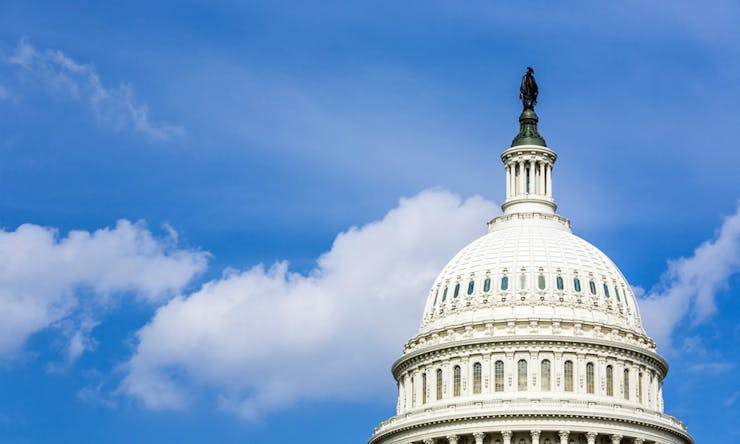WASHINGTON, D.C. – Under sunny skies dotted with rain clouds, federal lawmakers and industry advocates gathered near the steps of the US Capitol yesterday afternoon to cheer the House’s passage of the SAFE Banking in Cannabis Act this week and discuss what comes next.
The bill, HR 1595 which the House of Representatives passed 321–103 on Wednesday, was the first cannabis reform measure approved by the House in Congressional history and is seen as a major win for banks, investors, and much of the legal cannabis industry. If it’s approved by the Senate and becomes law, it would protect financial institutions that work with state-legal cannabis businesses despite the ongoing Schedule I status of cannabis under the federal Controlled Substances Act.
“This bill transcended party lines and usual partnerships,” said US Rep. Ed Perlmutter (D-CO), who introduced the SAFE Banking Act in March.“Our team of legislators was excellent, [and] the team of support we had from the outside community was what really got us across the finish line.”
“Part of the problem you’re seeing today—dealing with some of the vaping and its challenges—is because we don’t have a system that regulates and monitors.”
Perlmutter was joined by Reps. Earl Blumenauer (D-WA) and Steve Stivers (R-OH), who also championed the bill in the House. Representatives from major cannabis organizations, including Justin Strekal, political director of the National Organization for the Reform of Marijuana Laws (NORML), and Don Murphy, director of federal policies for the Marijuana Policy Project (MPP), were also in attendance.
“This is a watershed moment for those of us who have been working on the rationalization of cannabis policy for a long, long time,” said Blumenauer, a founding member of the Congressional Cannabis Caucus. “I’ve never met a single human being who feels there’s any rational purpose [to] forcing a state legal enterprise to be conducted on an all-cash basis, paying their taxes with duffel bags full of $20 bills.”
Murphy, of Marijuana Policy Project, said the passing vote “proves that this is no longer just about cannabis and people who want to get high. This is much bigger.”
Stivers, an Ohio Republican who previously chaired the National Republican Congressional Council, acknowledged the cooperation that went into the bill on the part of Democrats, Republicans, and industry. “I want to thank Ed [Perlmutter] and Denny [US Rep. Denny Heck (D-WA)] for being open to ideas that we had,” he said. “It was a collaborative effort, and they did listen.” Stivers noted that he does not support broader adult-use cannabis legalization despite advocating for the banking bill.
What happens next?
The SAFE Banking in Cannabis Act now heads to the US Senate, where it’s been endorsed by 33 of 100 senators, including five Republicans. It’s not clear whether the Senate will pass the bill, but advocates were optimistic.
“I think this bill, because of the safety implications of it, will be taken up by the Senate, and I look forward to [Sens.] Jeff Merkeley from Oregon and Cory Gardner from Colorado shepherding that bill through so we can eventually get it to the White House,” Perlmutter said.
Shop highly rated dispensaries near you
Showing you dispensaries nearMorgan Fox, media relations director for the National Cannabis Industry Association, agreed. “I think the hemp amendments in particular—if they make it into the Senate version—will put pressure on Leader McConnell to hear the bill,” he told Leafly. Sen. Mitch McConnell (R-KY), has recently been an outspoken advocate for his state’s hemp industry, and an amendment to the House version of the bill was added to extend banking protections to the hemp industry.
Sen. Mike Crapo (R-ID), head of the Committee on Banking, Housing, and Urban Affairs, signaled openness to cannabis finance reform this summer, striking a positive tone when speaking to Politico about the bill and predicting “good support” in the Senate.
Cannabis reformers were also hopeful that the passage of the banking act could break the dam on cannabis lawmaking in Congress.
“Yesterday’s House vote is the first vote in the United States Congress by standalone legislation that legitimizes the nascent and growing cannabis industry,” noted Strekal of NORML.
“It’s going to lead to other things,” predicted Blumenauer. “Part of the problem you’re seeing today—dealing with some of the vaping and its challenges—is because we don’t have a system that regulates and monitors.”
Who really wins?
While lawmakers and advocates in attendance were optimistic about the bill’s chances in the Senate, social justice groups and senators on both sides of the aisle have been critical.
Critics believe it does not go far enough in addressing the decades of violence, police harassment, and wrongful arrests suffered by cannabis consumers and patients, especially people of color and other minorities.
On Sept. 17, a joint coalition of organizations, including the ACLU, Center for American Progress, and Drug Policy Alliance sent a letter to House Speaker Nancy Pelosi (D-CA) and Majority Leader Steny Hoyer (D-MD) expressing concern that the banking bill would “undermine broader and more inclusive efforts to reform our country’s marijuana laws.”
Lawmakers, too, have expressed skepticism of putting banking interests before more comprehensive cannabis reform.
“Congress should not enact banking reform alone and think the job is done,” Senate Minority Leader Chuck Schumer (D-NY) said on Twitter last week. “We need decriminalization at the federal level, criminal justice reform, and investment in opportunity for minority & women-owned small businesses.”
“We can & must do more,” tweeted Senator Cory Booker (D-NJ) shortly after the bill’s passage on Wednesday. Rep. Alexandria Ocasio-Cortez (D-NY) also reportedly expressed unhappiness with standalone banking, though she voted for the act Wednesday.
Despite positive signals by Sen. Crapo of Idaho and a small group of Republicans, including Sens. Rand Paul (KY) and Lisa Murkowski (AK), there is skepticism about whether the Senate’s GOP leaders would even let the bill come to a vote. In July, the Senate Committee on Banking, Housing, and Urban Affairs held a hearing on the challenges of cannabis banking. Crapo, the committee chair, was the only Republican senator in attendance.
Perlmutter acknowledged he had no immediate plans to meet with McConnell or Crapo.
Asked by Leafly and other reporters about the bill’s viability in the Senate as well as ongoing social justice concerns, lawmakers acknowledged the challenges but stressed the need to focus on securing wins.
“Their concerns are legitimate, but you gotta get going,” replied Perlmutter.
“These other things,” he said, referring to social justice initiatives and other reform measures, “are teed up, and are coming up…This is the one that’s ready to go. This involves the safety of the customers, it involves the safety of the employees.”
“They’re going to start with our bill,” added Stivers. “Sen. Crapo has said that, and that’s all we can ask.”
Correction: An earlier version of this story mistakenly referred to Sen. Chuck Schumer as the Senate Majority Leader. He is the Senate Minority Leader.







